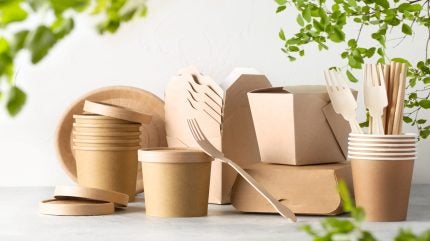
Researchers at Northwestern University, US, have developed a new graphene oxide-based water- and oil-resistant material for transforming food packaging.
The solution offers a nontoxic, recyclable, and compostable alternative to harmful plastics and per- and polyfluoroalkyl substances (PFAS).
The material improves the strength and barrier properties of paper-based packaging, making it a viable sustainable option for the food and beverage industry, according to the researchers.
GO-Eco, a subsidiary of Chang Robotics, is commercialising this patent-pending product, which is claimed to have outperformed current market solutions in third-party evaluations.
The material’s development is a collaborative effort between Northwestern’s mechanical engineering adjunct professor and Chang Robotics chief scientist Timothy Wei, and chemistry professor SonBinh Nguyen.
The US produces an estimated 14 million tonnes of paper-based food packaging and corrugated cardboard annually, contributing to more than $60bn in sales.
Traditional packaging often relies on environmentally harmful coatings for water and oil resistance. However, Northwestern’s graphene oxide material is claimed to offer a safe and cost-effective alternative, aligning with increasing regulatory pressures to eliminate toxic substances.
Extensive testing has demonstrated that the application of small amounts of graphene oxide enhances the barrier performance and strength of various packaging types by 30 to 50%, without incuring a significant cost increase.
GO-Eco, with support from the InQbation Lab, Northwestern’s Office of Undergraduate Research, The Alumnae of Northwestern University, and an exclusive licensing agreement with Northwestern, is now moving towards commercialisation.
GO-Eco’s advancements have led to funding from a national tableware manufacturer and partnerships for further development. The team’s next steps involve scaling up production, pursuing regulatory approvals, and conducting full-scale production trials to bring this sustainable solution to the global market.
Wei said: “This is not just a materials innovation; it’s a market-ready solution.
“We are thrilled to be taking GO-Eco from the lab to the factory floor, with applications that could ultimately transform the entire food packaging industry.”
In August 2024, Chang Robotics and Northwestern University’s INVO Lab announced a joint venture to reduce contamination from microplastics and PFAS in the US food supply.







